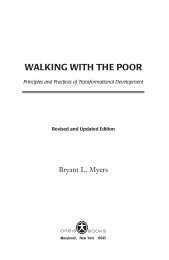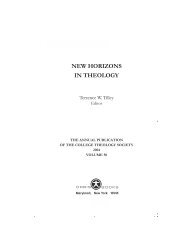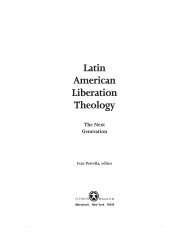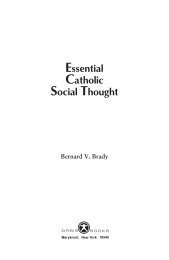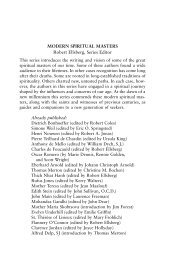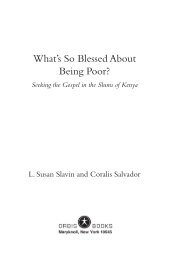CONCEPTS OF MISSION - Orbis Books
CONCEPTS OF MISSION - Orbis Books
CONCEPTS OF MISSION - Orbis Books
You also want an ePaper? Increase the reach of your titles
YUMPU automatically turns print PDFs into web optimized ePapers that Google loves.
Mission in Contemporary Missiology 21<br />
be encouraged if Christianity is to make sense to the people being evangelized.<br />
Mission as Dialogue with the Religions<br />
Dialogue with the religions has been recognized as an emergent dimension<br />
of mission. In this context, it has often been said that one of the most serious<br />
problems the church will face in the twenty-first century will be that of<br />
explaining the Christian meaning of soteriology in a plurireligious world,<br />
where religions have acquired such an important role. Mission theology has<br />
already made great progress in its study of the relationship between Christianity<br />
and other world religions. Today, Christians have come to admit not<br />
only that the great religions are praeparatio evangelica (“preparation for the<br />
gospel”), but also that each of them has its own proper life center, from the<br />
midst of which they have found fulfillment in Christianity.<br />
Though this teaching is clear and sound, the subject has given rise to<br />
some radical positions in the writings of theologians, particularly authors of<br />
the radical theology of religions. We are faced with an ambiguous concept:<br />
on the one hand, the church, which has always accepted the “possibility of<br />
the salvation of people who have not heard the Gospel”; on the other, “the<br />
soteriological significance of the same church.” With regard to the first point,<br />
Vatican II affirms the possibility of salvation in non-Christian religions (NA<br />
2). This fact has already been explained by Catholic missiologists associated<br />
with fulfillment theory. Today, however, some radical authors, such as Knitter,<br />
Hick, and others, speak of soteriology (soteriocentrism) in a context outside<br />
real theocentricism and even in opposition to Christocentrism (see<br />
Bellagamba 1993, 18ff.).<br />
But the teaching of the church continues the biblical tradition, recognizing<br />
the irreplaceable, unique role of the mediation of Christ, the savior; and one<br />
reaches salvation through faith in Christ himself and membership in his<br />
church on earth. However, because of the same Christ-event, since he is the<br />
only way to salvation, those who have not heard the gospel can attain salvation<br />
through ways only God knows, for we are dealing with a mystery:<br />
“Everyone, therefore, ought to be converted to Christ, who is known<br />
through the preaching. . . . So, although in ways known to himself God can<br />
lead those who, through no fault of their own, are ignorant of the Gospel to<br />
that faith . . .” (AG 7). Yet, this possibility of salvation outside the Christian<br />
religion does not lesson the missionary urgency (RM 4-9).<br />
Mission as Human Promotion<br />
The theological discussion on human promotion (known also in some quarters<br />
as liberation theology), in its various expressions, arises out of the con-




